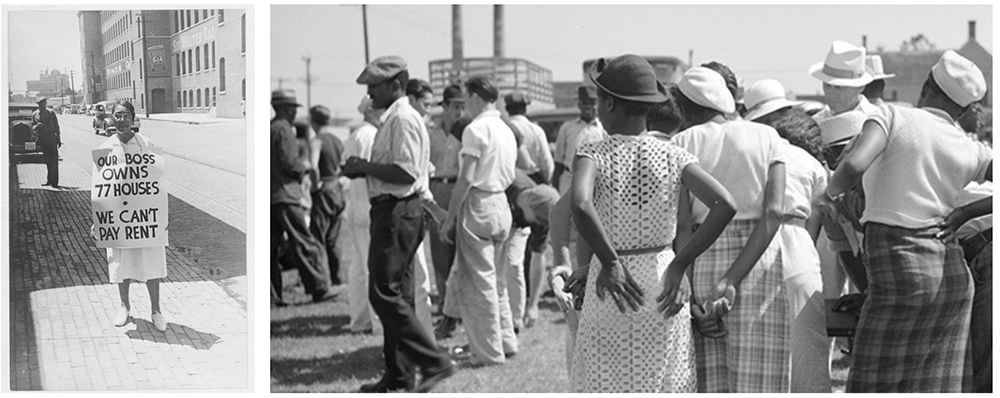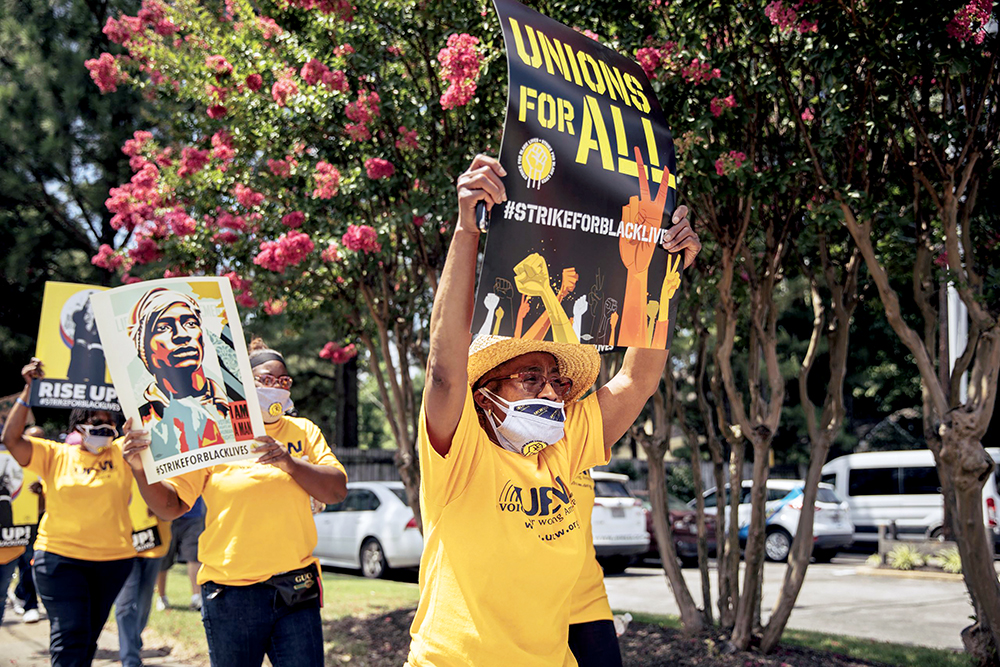As the November general election nears, Shelby County residents will soon vote for several key leaders in local, state, and federal positions, along with four proposed amendments to the Tennessee Constitution.
Tennessee Constitutional Amendment 1, or the so-called “right-to-work” amendment, is the central focus of labor organizers this election season. On the November 8th ballot, voters will be instructed to select “yes” or “no” as to whether they want to enshrine “right-to-work” in the state constitution, although the law has been on the books in Tennessee for 75 years, since 1947.
Supporters of the amendment say it will protect workers’ freedom of choice to join unions and strengthen the state economy. Former Tennessee Gov. Bill Haslam and current Gov. Bill Lee both support the “right-to-work” amendment, urging residents to vote ‘yes’ in a video statement.
“Right-to-work is common sense, and with federal efforts to repeal it nationwide, it’s time for Tennesseeans to speak up,” Lee said in the video statement. “This amendment will protect the rights of Tennessee workers and help keep our economy growing.”
But those who oppose the amendment, like Memphis labor organizer Jeffrey Lichtenstein, say that “it undermines the financial and political strength of unions,” ultimately limiting protections and collective bargaining efforts for people in the workplace.
Among the sponsors of the “right-to-work” amendment is Brian Kelsey, a Republican state senator; co-sponsors include Republican state Rep. Kevin Vaughan. Of state legislators who represent Shelby County voters in the Tennessee General Assembly, those in support and those against amending “right-to-work” in the state constitution are split at party lines, with Republicans for and Democrats against.
Under the “right-to-work” law, unions are required to represent all employees in a workplace, but unions are not allowed to require that workers pay membership dues in return. On paper, the law reads as if it prevents workers from being forced to join a union, but federal law already guarantees this protection. Essentially, it forces unions to provide workers with the benefits of union membership without paying any of the cost.

(Right) A 1937 packing plant strike in Maryland had both Black and white workers on the line together. (Photos: via Library of Congress)
THE ROOTS OF RIGHT-TO-WORK
The “right-to-work” movement began in the 1930s and took off in the 1940s, led by Southern segregationists and white supremacist businessmen who feared unions promoted worker unity and solidarity across racial lines. In fact, the phrase was popularized by Vance Muse, a Texas oil industry lobbyist and known associate of the racial terror group the Ku Klux Klan.
Dr. Martin Luther King Jr. actively campaigned against “right-to-work” legislation during his lifetime, drawing the connection between racial and economic equity. In 1961, he told the AFL-CIO that “the labor-hater and labor-baiter is virtually always a twin-headed creature spewing anti-Negro epithets from one mouth and anti-labor propaganda from the other mouth.”
Twelve states, including Tennessee, enacted the law in the 1940s. Over the next several decades, other states adopted “right-to-work” laws, but Tennessee is the first state in the 2020s to attempt to change its constitution with a “right-to-work” amendment. Alabama was the last state to successfully do so in 2016, and Oklahoma did the same in 2001.
Today, 27 states are “right-to-work” states, including Tennessee and the rest of the South. Just nine of those states currently have “right-to-work” enshrined in state constitutions, while 18 have laws on the books. If Tennessee becomes the 10th state to amend its constitution with “right-to-work,” it could “open the floodgate to it happening in other Republican-controlled states around the country,” Lichtenstein said.
Opponents of Tennessee Constitutional Amendment 1 said embedding “right-to-work” in the state’s constitution aims to limit the bargaining power of unions since it requires them to represent all employees in a workplace, whether or not they are dues-paying union members.
“If there are a bunch of people in unions who are benefiting from them and are not paying any dues to cover the cost of those services, the unions in the state are sort of being sucked dry,” said Lichtenstein. “[Unions are] unable to fight for better working conditions, to expand union membership, to fight for better workplace protections across the state.”
If “right-to-work” is amended in the state’s constitution, it will become markedly more difficult for future voters and state leaders to pass legislation in favor of organized labor, workers, and unions, “right-to-work” opponents say.
Under current federal law, employers are prohibited from discriminating against workers who refuse to join a union as a condition of employment. So the long-term goal of “right-to-work” is to steadily and slowly erode the collective bargaining power of labor unions — effectively erasing the collective power and voice of workers, according to Lichtenstein.
“[A union] is funded by its membership, and it has, more than anything else in this country’s history, the strongest record of anti-poverty and fighting for economic equity,” Lichtenstein said.
WORKING IN A “RIGHT-TO-WORK” STATE
Sweetrica Baker, operations and digital organizing coordinator with the Memphis and West Tennessee AFL-CIO Labor Council, said “right-to-work” states tend to have lower wages, and the data backs up her claim.
A 2015 study by the Economic Policy Institute shows people in “right-to-work” states, like Tennessee, earn an average of 3 percent less in wages than those in non-“right-to-work” states.
In “right-to-work” states, union density — the percentage of workers who are union members — is low, at 6.5 percent, while membership in states that do not have the law on the books is more than double, at almost 14 percent, according to a 2019 analysis by Bloomberg Law. Union organizing activity and work stoppages are also lower in “right-to-work” states, the analysis shows, with non-union workers earning less than union workers, and workers overall earning less in “right-to-work” states.
Altogether, people in “right-to-work” states earn $11,058 less per year, the poverty rate is higher at 11 percent, workers are 12 percent more likely to be uninsured, and workers have a 57 percent higher risk of dying on the job than people in non-“right-to-work” states, according to AFL-CIO’s Common Sense Economics training program.
“Right-to-work” supporters, like former Gov. Bill Haslam, say the law supports economic growth, citing “a lot of success recruiting jobs to Tennessee.” Haslam said “right-to-work” is a fundamental reason the state is a good place to live and work.
Opponents of “right-to-work” say the law is why employers are attracted to states like Tennessee: “Businesses come here for that specific reason. They’re concerned about growing their money,” Baker said.
Today, Memphis is one of the poorest large metro areas in the nation. Of the 25 largest employers in the area — including FedEx, which employs 30,000 workers alone — only two employers, Shelby County Schools and University of Tennessee Health Science Center, supported increasing hourly wages during the 2018 “Fight for $15” campaign.
Baker said the effects of what she sees as anti-union and anti-worker “right-to-work” legislation trickles down into communities. People who earn low wages have difficulty accessing affordable food and affordable housing, ultimately leading to less money circulating in the local economy. She said the law negatively impacts funding for public schools, infrastructure, and other public goods and services supported by taxpayers, who tend to spend less when wages are lower.
In Memphis, the economy is based heavily on low-wage jobs. Lichtenstein said those who support amending “right-to-work” in the Tennessee Constitution envision a state that’s built on low wages and economic inequality.
“Most people that I talk to think that labor has an inherent dignity, and folks should be able to live a good life working a regular job,” Lichtenstein said. “That’s also good economics. When you raise wages, you actually help the economy.”
Brittany Brown is a corps member with Report for America, a national service program that places journalists in local newsrooms. Email her at brittany.brown@mlk50.com.
This story is brought to you by MLK50: Justice Through Journalism, a nonprofit newsroom focused on poverty, power, and policy in Memphis.
